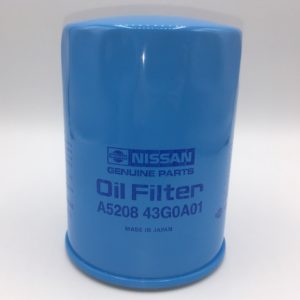
One of the most critical aspects of 240Z ownership and maintenance is routine and proper changing of your oil. The L24 engine, while known for being highly reliable, needs regular oil changes like any other car. Fortunately, this is something you can do yourself as opposed to taking it to the shop to get done. This guide will serve as a reference for engine oil type, weight, temperature differences, and more.
We also have a video version of this guide on our YouTube channel — this video is embedded at the bottom of this guide if you would like to watch it alongside reading our text instructions here.
Some of the links on this page may be affiliate links, meaning I receive a commission (at no extra cost to you) if you click on the link and make a purchase. I only recommend products I’ve used and trust unless stated otherwise.
All Datsun L-series engines utilize a wet sump oil supply in their lubrication systems, which means that the crankcase is used as the primary reservoir for oil, as opposed to a separate, external reservoir you will see in dry-sump oil supply systems. This means that draining the oil is done by removing the drain plug at the bottom of the oil pan as opposed to on some separate reservoir like you might see in a dry-sump system.
Lubrication Intervals
It is generally recommended that for any classic vehicle, you should change your oil every 3,000 miles, and that the filter should be changed every 6,000 miles. However, with classic cars such as the 240Z, we recommend also considering how long the oil has been in the crankcase. Oil that sits idle at the bottom of the crankcase can break down in the presence of contaminants such as dirt, gas, or really any debris that might be present in your oil, regardless of whether or not you’ve been running the engine. So, change the oil every 3,000 miles or every 6-12 months, whichever comes first. If the 240Z is put away for the winter it is always recommended that you change the oil as part of your spring maintenance as you bring your 240Z out of hibernation. Additionally, it is a great idea to regularly check the oil and to top off the oil if you notice the oil-line on the dipstick getting close to the ‘low’ indicator.
Oil Type
In general, the engine oil you should be using for your 240Z is 10W-30, however there are some considerations you should keep in mind with respect to temperature. Below is a chart you can follow for deciding what engine oil to use in different climates:
| Temperature (Fahrenheit) | Under 10 degrees | 10-32 degrees | 32-90 degrees | Over 90 degrees |
| Oil Type(s) to Use | 10W-30, 10W, or 5W-20 | 10W-30, 10W-40, or 10W | 10W-30, 10W-40, or 20W | 10W-30, 10W-40, 20W-40, or 30W |
We recommend Lucas Oil’s high zinc engine oil. The most important consideration to keep in mind when choosing the type of engine oil for your 240Z is that it should be a high-zinc oil. Due to the L24’s flat-tappet camshaft design which involves sliding contact rather than rolling contact. It is highly recommended that you use a high-zinc oil which provides wear protection in areas of increased friction such as the cam/lobe interface. While you may have to look a little harder to find high-zinc oil or order online, it is well worth the extra effort and is a great precaution to take in a classic engine like the L24.
The next question we get a lot from readers is whether or not it is fine to use synthetic oil, and the answer is, of course! Synthetic oil refers to any oil which features any artificial additives. So of course, our recommendation of high-zinc oil falls under that category.
Filter Type

The 240Z requires a cartridge-type oil filter as opposed to a permanent housing setup for the filter. We strongly recommend going for a Genuine Nissan OEM oil filter which is readily available on our store. This is a great option for those who want to add another element of originality to their engine bay and this is of course a reliable filter as it is manufactured by Nissan.
Another important note here is that you should stay away from FRAM oil filters! FRAM filters are cheap, but naturally this means that the actual build quality is cheap. I normally try to stick to only recommending products I believe in, but I have heard too many horror stories of FRAM filters breaking up and becoming adding contaminants instead of capturing them! I have heard of more than one occasion where the paper inside of a FRAM filter came loose and caused havoc inside the engine by going straight for the camshaft. While it may be tempting due to the cheap price point, I recommend you steer clear of FRAM filters.
Oil Capacity
The Datsun 240Z L24 engine has an oil capacity of approximately 4.7 quarts, or 4.4 liters.
Oil Change Process
Start the engine and let it idle for a few minutes to heat up the oil. This is helpful because it will allow the oil to flow more freely so you can accomplish a more “complete” oil change. Locate the oil drain plug on the bottom of the crankcase. The socket size you’ll need is 22mm, although a 7/8″ socket will work just fine. Line up your oil catch pan and remove the plug. Be careful of hot oil and do your best to catch the nut and washer (you might actually have a rubber gasket instead of a washer) before the oil starts pouring out. If you miss it, don’t worry — it happens to the best of us! Just be careful when retrieving the nut and washer from the pan of hot oil.
Depending on how well your 240Z has been maintained, you may be missing the copper crush washer which came standard. If you do have a crush washer, you can get away with reusing the crush washer a few times to no ill-effects, but eventually you should replace it. You can get a new crush washer at ZCarSource here.
To remove the old oil filter, simply unscrew it off. Make sure you have aligned another oil catch pan below the filter as oil will be spilled as the filter is removed. If you cannot quite get it by hand, you will need to use an oil filter wrench which can encompass the relatively large diameter of the factory recommended filter of 3.8 inches. Another alternative method is to drive a long punch through the oil filter and use it as a handle to turn it, but we don’t necessarily recommend this when oil filter wrenches are so readily accessible.
With the filter removed, simply wait a few minutes for the oil to drain fully.
To install your new oil filter, simply screw it in place. Note that for any throw-away cartridge type filter, the gasket is built in to the filter itself. Do not over-tighten the filter: Screw it until it reaches the engine block, and then tighten a half-turn after that, and you’re done. Reinsert the oil drain plug, also taking care not to over-tighten it and strip the threads.
The 240Z has an oil capacity of 4.7 quarts without a filter. We have found that with the factory recommended filter, it is actually take closer to a full 5 quarts for the dipstick to read ‘full’, but be sure to check the dipstick on your vehicle to be certain. Start the engine and ensure there are no leaks by feeling around the oil filter-engine block interface as well as around the drain plug, and you should be good to go.
Checking Oil Level
If you’d like to just check out your oil level as opposed to completely changing your oil, it’s also pretty simple:
- Park on a level surface.
- Ensure the engine has been warmed up a bit.
- Pull out the dipstick and wipe it off with a paper towel.
- Re-insert the dipstick and pull it out once it has been completely inserted.
- Check to see where the oil-level reads on the dipstick scale.
Video Guide on YouTube
We also have a video version of this guide on our YouTube channel which is embedded below. Please consider subscribing if you found it helpful!
